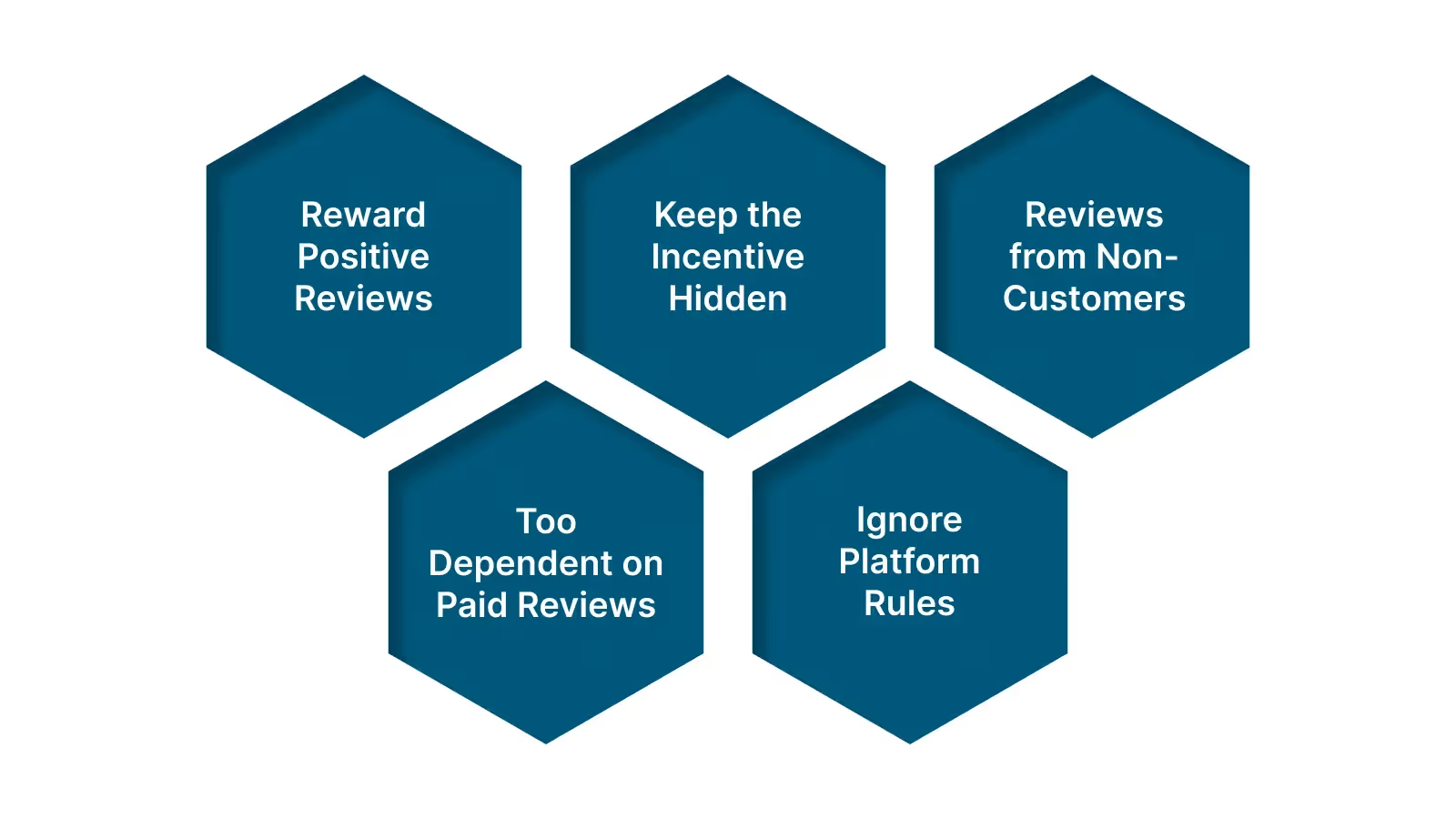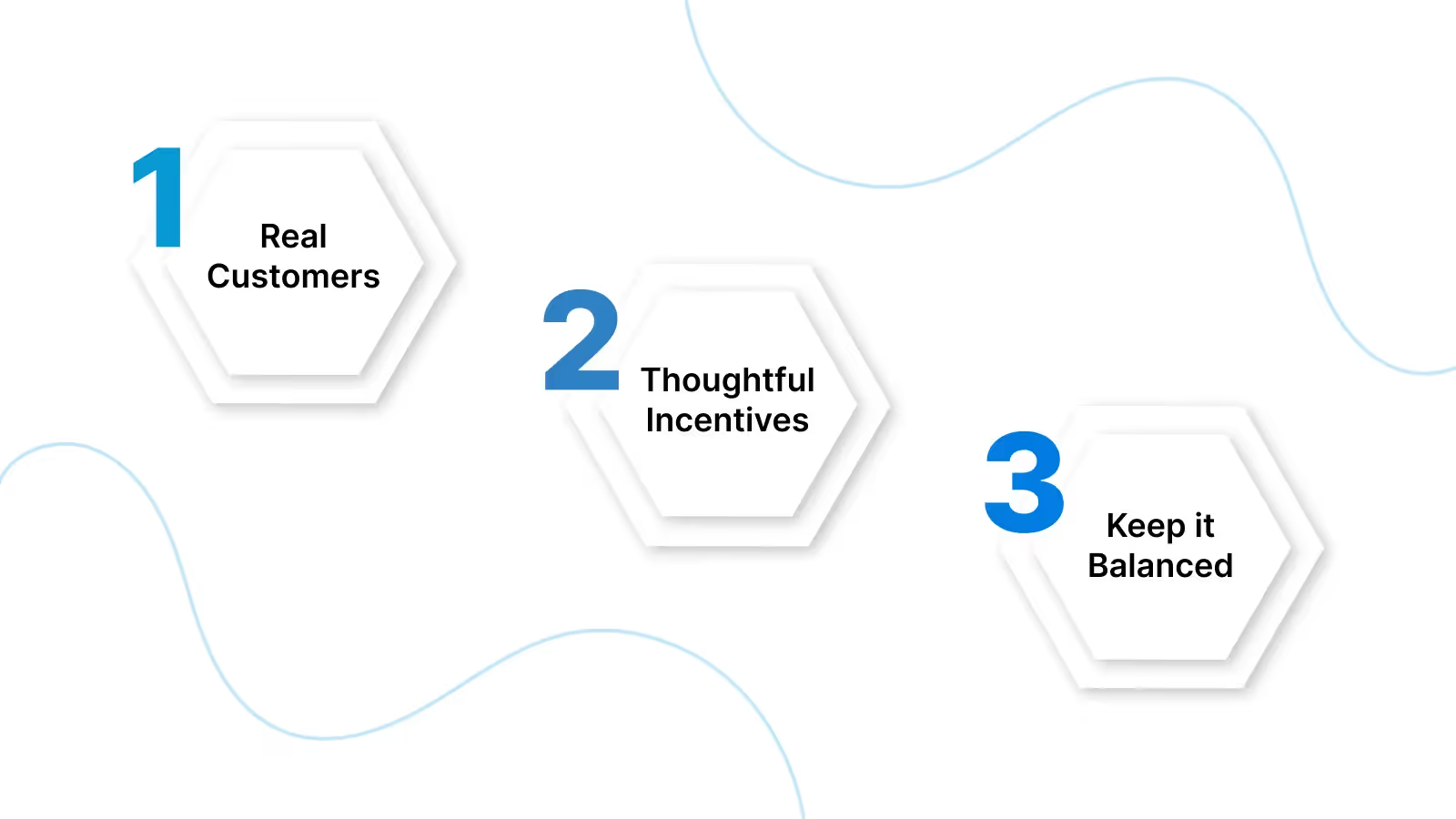.avif)
.avif)
Customer reviews are among the most powerful forms of social proof in e-commerce, especially for Shopify stores. In fact, a recent survey conducted ahead of National Leave a Review Day found that 54% of consumers trust online reviews more than recommendations from friends and family (24%), highlighting just how influential peer-generated content has become in the purchasing journey.
In crowded marketplaces where numerous products compete for attention, a few strategically placed, authentic reviews can make the difference between browsing and making a purchase. One popular tactic for accelerating review collection is incentivized reviews, offering loyalty points, discounts, or product samples in exchange for feedback.
But while this method may seem like a smart growth strategy, it raises critical questions around authenticity, transparency, and compliance. Done wrong, incentivized reviews can backfire, damaging trust and even violating platform guidelines.
Key Takeaways
- Incentivized reviews can accelerate traction, but only if they're done right.
- FTC’s new rules mean no shortcuts: disclosure is non-negotiable.
- Tying rewards to review sentiment? Now a legal risk, not just a reputational one.
- Review platforms have their own rules, Google and Yelp don’t tolerate incentives.
- Authenticity is the real growth lever. Use incentives to invite honesty, not buy praise.
- Build systems for transparency and balance. That’s how you turn reviews into long-term brand equity.
- How might we scale social proof while protecting trust at every step?
What Are Incentivized Reviews?
Simply put, incentivized reviews are customer reviews where the reviewer receives a reward for leaving a review about the business. For Shopify store owners, it’s a popular way to encourage more customers to share their experiences after a purchase, especially when starting out or launching new products. The impact of reviews is more than just anecdotal: a one-star increase on Yelp has been linked to a 5–9% boost in revenue, highlighting just how influential customer feedback can be on buying behavior and business performance.
This is especially helpful when engagement is low or during new product launches. Common incentives include:
- Loyalty points that can be redeemed for future discounts
- Exclusive promo codes
- Free samples or small gifts with the next order
- Entry into a giveaway or contest
It’s important to note that incentivized reviews are not the same as fake or manipulated reviews. The goal isn’t to buy positive feedback or mislead potential customers, but to reward honest opinions, good or bad.
Tools like Nector let you create flexible reward campaigns, automating personalized review requests and rewarding loyalty points for honest, verified feedback, all from one dashboard.

Why Incentivized Reviews Are a Smart Growth Strategy
If you're launching a new store or rolling out a fresh product line, getting those first few reviews can be a real hurdle. That’s where incentivized reviews come in; they give customers a reason to share their thoughts when there’s little existing feedback to lean on. And that early momentum matters: research shows that 68% of consumers form an opinion about a product or brand after reading just one to six reviews. In other words, a handful of honest reviews can make or break a potential buyer’s decision.
Here’s why they work:
- Accelerate review volume and user-generated content (UGC): More reviews mean more credibility and more social proof.
- Build trust quickly: Early reviews give shoppers the confidence to buy, especially when there’s no long track record.
- Boost SEO and conversions: Reviews add fresh content to your product pages, helping with search visibility and improving buyer confidence.
- Encourage repeat purchases: Offering rewards like loyalty points for reviews gives customers a reason to come back.
Used thoughtfully, incentivized reviews can be a powerful tool to grow your store, as long as they’re done transparently. However, there are important caveats to keep in mind when using incentivized reviews. So, if you’re planning to promote this feature, it's best if you take a look at the following section.
Also read: Why Customer Reviews Matter: Boost Trust, Sales, and SEO for Your Business.
What the FTC’s New Review Guidelines Mean for Your Business

Incentivizing reviews can be a powerful growth lever, but only if done within legal boundaries. Before offering discounts, loyalty points, or free products in exchange for customer feedback, it’s critical to understand the FTC’s updated guidelines on endorsements and testimonials.
These rules aren’t just bureaucratic red tape; they’re designed to ensure transparency for consumers and fairness in the marketplace. Any failure to disclose incentives or attempts to manipulate reviews can have serious consequences:
- Legal penalties: The FTC can impose substantial fines on businesses that violate disclosure rules, especially if deceptive practices are involved.
- Platform enforcement: Marketplaces like Amazon, Google, or Shopify may remove non-compliant reviews, flag your listings, or even suspend your store.
- Brand damage: Customers are increasingly skeptical of anything that seems “too perfect.” If your reviews appear dishonest or manipulated, you risk eroding the trust you’re trying to build.
Complying with the FTC’s guidelines isn’t just about avoiding trouble; it’s about protecting your brand’s long-term credibility. The key is to strike a balance: incentivize ethically, and always disclose the nature of the reward. Transparency is what turns a review from a risk into a reliable engine for growth.
Read: Unleash Your Shopify Store's Potential with These Top 10 Reviews Apps
FTC Guidelines
In July 2024, the Federal Trade Commission (FTC) finalized a long-anticipated rule to combat deceptive reviews and testimonials online. Unlike previous guidance, which relied heavily on case-by-case enforcement, this new rule gives the FTC civil penalty authority, meaning businesses can now face direct fines for violating these standards. If you’re running a Shopify store that relies on reviews for trust and conversions, understanding this rule is crucial.
What the Final Rule Prohibits
Here are the key practices now explicitly banned under this new ruling:
- Fake Reviews and Testimonials: Whether AI-generated or submitted by someone with no real experience, any review that misrepresents the identity or experience of the reviewer is prohibited. This includes businesses creating, purchasing, or knowingly sharing such content.
- Paying for Biased Reviews: It is now illegal to offer incentives, explicitly or implicitly, based on the tone of the review (positive or negative). Even offering a discount in exchange for “a good review” could trigger a violation.
- Undisclosed Insider Reviews: Reviews written by employees, founders, managers, or their family members must now include a clear and prominent disclosure of their relationship to the business. Simply leaving out the context is considered deceptive, even if the review is accurate.
- Misleading Independent Review Sites: If you operate or contribute to a website that claims to offer objective product reviews, but you promote your own products without disclosure, that’s a direct violation.
- Suppressing Negative Reviews: Using legal threats, intimidation, or hiding unfavorable reviews, especially when falsely claiming your site displays “all” customer feedback, is now explicitly banned.
Fake Social Proof: Buying followers, likes, or views to exaggerate your brand’s influence is now prohibited if it misleads users about your reputation or reach.
Why This Matters for E-Commerce
For Shopify sellers, especially those using third-party apps to collect and showcase reviews, this rule has serious implications:
- Automation doesn’t protect you — If a plugin or external agency provides reviews, you're still accountable.
- Transparency is non-negotiable — Disclose all incentives clearly and prominently. A vague mention in your terms and conditions won’t suffice.
- Real reviews, real customers — Prioritize collecting feedback from verified buyers. Avoid shortcuts that might be seen as manipulating social proof.
What You Should Do Next
- Audit your review strategy: Remove any reviews from friends, employees, or affiliates that don’t disclose the relationship.
- Review your incentives: If you’re offering rewards for reviews, make it clear they’re rewarded for participation, not for saying something positive.
- Update your review display: Make sure your review widget or section doesn’t give the impression of filtering out critical feedback.
- Avoid gray-market services: Any third-party provider that promises "guaranteed 5-star reviews" or "real-looking followers" is now a direct liability.
Site Guidelines
While the FTC sets federal rules, individual review platforms often have their own policies when it comes to incentivized reviews, and they’re not all the same.
- Yelp: Completely bans any form of incentivized reviews. This was mostly due to the fact that they found out 28% of users look for compensation signals, and 71% avoid businesses with paid or fake reviews.
- Amazon: Incentivized reviews outside of Amazon Vine are strictly prohibited. Sellers once encouraged reviews with free or discounted products, but Amazon ended that program in late 2016. Violation can result in the removal of reviews, account suspension, or outright ban
- Google Business / Maps: Google prohibits offering money, discounts, or goods in exchange for reviews, especially if targeted at positive feedback. If caught, businesses may lose reviews, face suspension, or see search ranking penalties. Additionally, Google Maps now flags profiles with suspicious review activity.
- Shopify-integrated review apps: Generally allow incentivized reviews if you include transparent disclosures and do not pressure for positive-only feedback.
The bottom line is that you should always check each platform’s policy before offering incentives. Encourage honest reviews, disclose any rewards clearly, and don’t punish customers for honest feedback. So, with these considerations in mind, how do you actually go about getting authentic incentivized reviews?
Also read: Myth vs. Reality: Uncovering the Truth About Loyalty Program Reviews.
What to Avoid When Incentivizing a Review

- Tying rewards to positive reviews
Never offer discounts, points, or freebies only for 5-star reviews. It’s misleading and violates FTC rules. - Failing to disclose the incentive
Every incentivized review must clearly state that a reward was offered, no hidden disclosures or vague T&Cs. - Collecting reviews from non-customers
Reviews must come from real, verified buyers. Avoid collecting feedback from giveaway participants who never used the product. - Over-relying on incentivized reviews
Too many rewarded reviews can feel inauthentic. Maintain a healthy mix of organic and incentivized feedback. - Ignoring platform-specific rules
Google and Yelp ban all incentivized reviews, even if honest and disclosed. Check each platform’s policy before running campaigns.
How to Get Authentic Incentivized Reviews

Once you’ve decided to use incentives as part of your review strategy, the next challenge is making sure the feedback you collect is genuine and valuable. Incentives don't automatically mean honest reviews, so it’s important to strike the right balance between motivating customers and maintaining trust.
Target Real Customers
Authentic reviews come from real buyers. The best approach is simply to ask. Reach out to your email list, social media followers, or existing customer base after purchase. Timing matters, too, so send review requests while your product is still fresh in the customer’s mind.
If you have a community space, like a Discord group or branded forum, that’s another great place to engage. It may take extra effort upfront, but nurturing those channels can lead to long-term value.
Offer Thoughtful Incentives
A small gesture like loyalty points, a limited-time discount, or early access to new launches can go a long way. You could also offer free samples in exchange for an honest review.
Just make it clear that the feedback doesn’t have to be positive; what matters is honesty.
Stick to light-touch incentives that feel like a thank-you, not a bribe. The message should always be: “We value your opinion,” not “We’ll reward you for saying something nice.”
Read: The Future of Reviews: Emerging Trends and Technologies for Better Customer Engagement
Keep It Balanced
Incentivized reviews can give your store a helpful push, especially when you're starting out, but they shouldn’t be your only source of feedback.
To build lasting credibility, aim for a healthy mix of incentivized and organic reviews. The ones left without any prompt or reward will often carry more weight with shoppers because they feel unbiased and spontaneous. They also reduce the risk of your store appearing overly curated or promotional.
Use incentivized reviews as a supplement, not a substitute. The best-performing stores on Shopify don’t rely on just one kind of review; they build trust through a blend of real stories, social proof, and authentic interactions.
When done right, incentivized reviews can build lasting trust between your brand and your customers. And, with the right tools in place, you can streamline the process, stay compliant, and turn incentivized reviews into a powerful visibility booster for your Shopify store.
The question is, who’s the right partner to help you do it?

Why Use Nector for Incentivized Reviews?
Nector makes it easy to turn reviews into a growth engine for your Shopify store. With customizable tools and seamless integration, you can collect, display, and reward honest customer feedback while staying fully compliant.
- Embed reviews seamlessly: Add floating widgets or highlight testimonials directly on your storefront for stronger social proof.
- Boost conversions: Make reviews a natural part of product pages to help turn visitors into buyers.
- Customize the look: Match the review widget with your brand’s design for a consistent visual experience.
- Engage through replies: Respond to customer reviews to foster trust, loyalty, and community.
What sets Nector apart is how it ties reviews and rewards together. You can easily motivate customers to leave reviews by offering loyalty points, with extra incentives for things like photo uploads. In fact, this was the highlight of one of its collaborations.
One popular audio gear retailer partnered with Nector to strengthen its loyalty program by tying it directly to customer reviews. Through a seamless integration with Judge.me, the brand launched a campaign to reward shoppers for leaving honest feedback.
By recognizing and rewarding real customer voices, the brand boosted engagement and reinforced its credibility, turning reviews into a high-impact growth channel.
Over 6,000 reviews were incentivized and rewarded, fueling a surge in user-generated content and reinforcing buyer trust. More importantly, this initiative helped build a deeper sense of community, showing customers that their opinions genuinely matter.
With Nector, you can transform every review into a meaningful connection between your brand and your customers.
Final Thoughts
Incentivized reviews, when done right, can be a platform for building trust. They help newer brands gain traction, encourage valuable feedback, and create a steady stream of social proof that influences buying decisions.
But they only work when they’re transparent, ethical, and balanced with organic reviews. Staying compliant with platform rules and FTC guidelines protects the authenticity that customers crave.
With powerful automation, review-to-reward integration, and fully customizable widgets, Nector simplifies every step of this process. Our platform helps you collect honest feedback, stay compliant, and grow your store with the kind of credibility that actually converts.
Ready to turn customer reviews into real growth for your Shopify store? Book a demo with Nector and see how easy it is to automate, reward, and scale authentic feedback.
FAQs
What is an incentivized review?
An incentivized review is feedback shared by a customer in exchange for a reward, such as loyalty points, discounts, or free samples. The goal is to encourage honest, helpful reviews while offering a small token of appreciation.
Are incentivized reviews legal?
Yes, incentivized reviews are legal, as long as they’re honest, not tied to positive feedback, and clearly disclosed to readers. Compliance with FTC guidelines is essential to avoid penalties.
Is it illegal to pay for reviews?
Paying for reviews that are fake, misleading, or undisclosed is illegal under FTC rules. Any compensation must be transparent, and reviewers should never be pressured to leave only positive feedback.
Does Google allow incentivized reviews?
No, Google prohibits offering money, discounts, or free items in exchange for reviews. Doing so can lead to penalties such as review removal or business profile suspension.
What does an incentivized review mean for users?
Even without making a purchase, some users may receive product samples or enter giveaways in return for leaving a review. As long as they’re honest and the incentive is disclosed, it’s considered legitimate.
Start Building Customer Retention That Lasts






.avif)
.avif)

